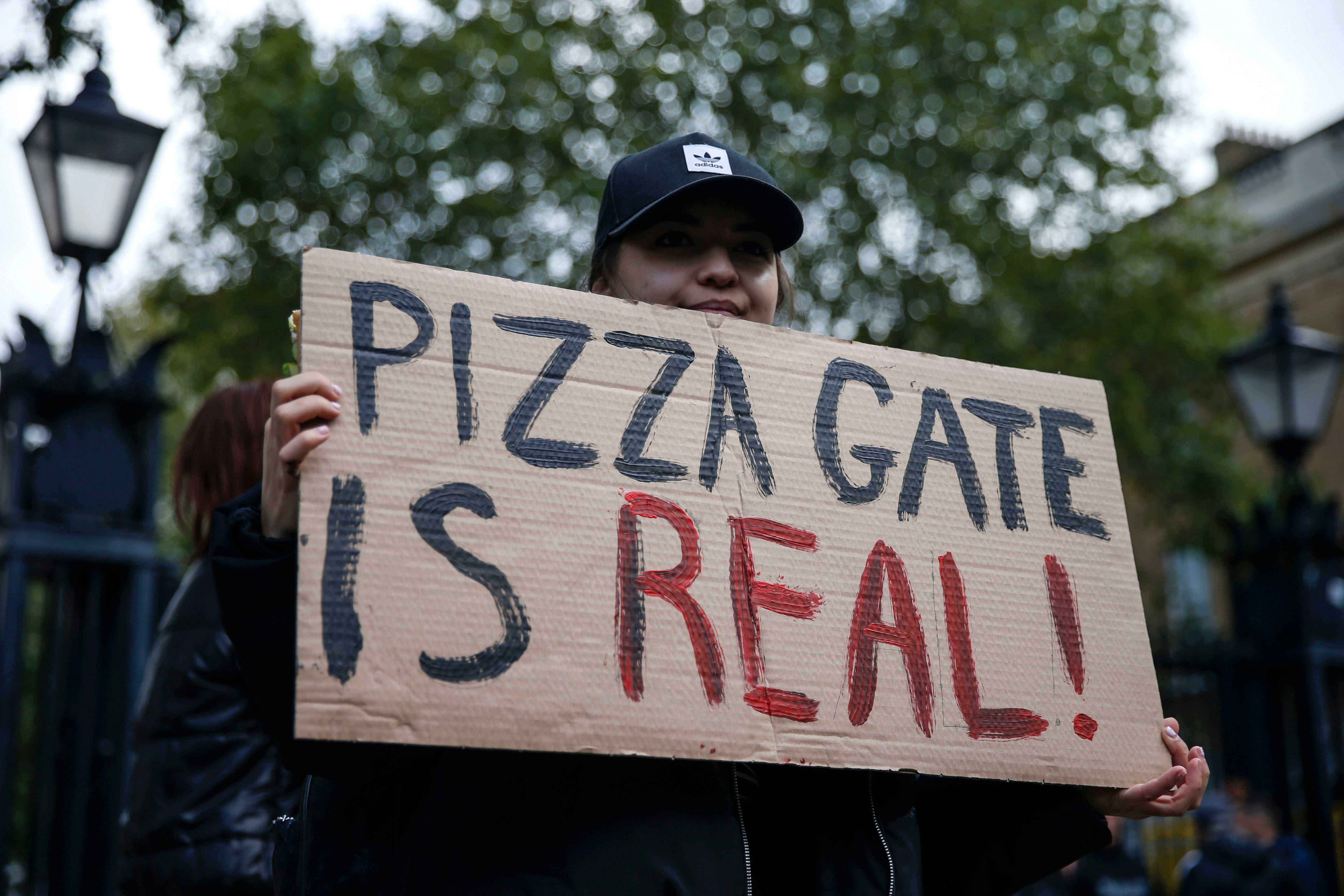How I was radicalised on Telegram – and came out the other side
The app became the epicentre of disinformation during the far-right riots last week – but it’s long been a platform for conspiracy. Two formerly radicalised users tell Zoë Beaty how they fell down the rabbit hole


One link. A click. A curious statement: what they don’t want you to know. It’s 2020 and Jess* is in her room, at the back of her parent’s terraced house in Hull, unaware that she’s about to fall down a rabbit hole. Before now she’s never heard of the social media app Telegram, or 4chan – an anonymous posting board that quickly became the home of internet subculture, and conspiracy. Soon, it would take the next year of her life.
“I saw a rambling post on pizzagate,” she explains – a famous, completely false theory about a child sex ring run from the basement of a pizzeria in Washington DC.
“To be honest, I was afraid,” she says. “I was petrified, actually. I kept reading, needing to know more. Because if all of this – what I was reading – was true, it would completely reshape my world.”
Within just a few weeks Jess, who was studying at university, was reading screenshots of Hillary Clinton’s emails, convinced she was a paedophile. She quickly began to believe posts predicting that Donald Trump was going to come forward with serious allegations and arrest warrants for “pretty much every celebrity, for child endangerment”, Jess says.
“There were accusations against celebrities, the media… for horrific crimes against children. Everyone thought I was crazy.” But, quickly, Jess was fully invested in the fantasies of the far-right world, which, even off the app, were often disseminated as screenshots from Telegram. “In a way I was smug – you see yourself as above others. You’re told that others are just naive to any other possibilities.”
Over the last two weeks, Telegram has been noticeably present in headlines and discussion around the far-right riots. It was screenshots of this app that circulated from fascists organising gang violence in towns around the country; on X/Twitter, users perpetuating violence directed their followers to Telegram.
This isn’t new. In fact, Telegram has long been an epicentre of dangerous right-wing narratives and conspiracy. Only, after the Southport killings, Telegram’s usually obscure users spilled out onto the streets.
“Telegram is currently one of the most popular platforms in the world, and will probably become even more visible in the coming years,” says Ruslan Trad, a security researcher at American think tank the Atlantic Council’s Digital Forensic Research Lab.
“Why is it a popular platform? The need for secrecy and privacy is at the core. Whether we’re talking about teens talking about favourite hobbies and sex secrets, or radicals staging riots and terrorist attacks, Telegram has become a major destination over the years,” he says.
He adds that Telegram “has played a major role in spreading propaganda”. Far-right groups who have discovered the app have “found it possible to speak out without worrying that their content will be deleted”.

Telegram saw a rise in popularity during the pandemic – that’s when people like Jess discovered it, and Michael’s parents, too. Before the pandemic, Michael’s dad, Carl*, had been into what he deems “more light” conspiracies, “like the fake moon landing, cold fusion, electric universe” (a theory that challenges the cosmology showing that the universe is gravity-dominated, arguing instead that a web of electromagnetism connects the planets). “But, when my dad got onto Telegram, it got much worse.”
He was talked into joining a group on the app, Michael, 26, who wishes to protect his identity, says. Telegram made him a crucial promise – to show what was “really happening” behind the pandemic. Really, it wasn’t so unusual and, in many ways, it makes sense. Many of us went looking for answers and sought control when the world seemed to suddenly fall apart. On Telegram, Carl believed that’s what he found.
Soon, it was all that he could talk about. “He never wanted to push [conspiracy theories] on me before the pandemic, so there wasn’t really a problem then,” Michael, who lives in Chemnitz, Saxony, in Germany, and begins his masters in physical technology this September, explains. “Back then, we could talk about literally anything and everything.”
Once Carl got Telegram, he would show Michael content from the groups – “the worst content for conspiracy nuts you can think about,” he says – and try to convert him.
Slowly, Michael’s mum also started to believe the theories too. For two years Michael tried hard to argue the truth, but it took its toll on him as their insistence only grew more aggressive. He burnt out and “with no defences left” began to accept what they were telling him. Michael refused to get vaccinated against Covid, and began to isolate himself as reality rocked on its foundations .
They called themselves ‘Noah’s Ark for unvaccinated people’. That’s a pretty good description if you ask me. It shows how nuts they are
“I lost all sense of direction, every last bit of motivation,” he writes on Reddit. We’re speaking over the platform because he can’t risk his parents, who are still fully consumed by conspiracy, hearing our conversation.
For months Michael was depleted and embroiled. But being “on my dad’s side” gave him space from the constant opinion-pushing and, eventually, allowed him the mental capacity to begin to question what he believed again.
When Russia attacked Ukraine, his parents became pro-Russia – which helped Michael realise that they were on the wrong side. But by then his parents had also become obsessed with chemtrails (the theory that governments have a secret programme to add toxic chemicals into the air from planes), the Great Reset, and the climate change hoax. They were deep into the well.
The tipping point came last year, when Michael’s parents said they wanted to move to Paraguay to “flee the ‘big plan’”, says Michael. “It was a place for like-minded people to move into and get through the rough times they imagined. They called themselves ‘Noah’s Ark for unvaccinated people’. That’s a pretty good description if you ask me. It shows how nuts they are.”
But their decision sent Michael over an edge. He says: “It was like a final goodbye and I just couldn’t take it.” Soon after their announcement, he ended up in psychosis, his brain completely overloaded, and was admitted to hospital.

Now the family don’t talk about conspiracy at all, which Michael says has infinitely improved their relationship. His dad still goes out on a “walk” (“which means a protest,” he says) every Monday morning as he has since the pandemic, and his mum is just as infected by what Michael calls an “informational virus”. “Thinking about this feels like trying to lift a car with your bare hands,” he writes on Reddit. “I love them. It hurts.”
So, how can an app like Telegram become so deeply effective in spreading disinformation?
“Telegram was a useful platform for conspiracists in the pandemic, because as social media platforms slowly introduced stronger rules around Covid and vaccine disinformation, Telegram was a place where conspiracy theorists could encourage their followers to go and get their rawest, falsest content,” explains Callum Hood, head of research at the Centre for Countering Digital Hate.
“And they could build communities on Telegram that would survive any changes in terms of their access to mainstream platforms.”
People reach Telegram via mainstream platforms like X. “They’ll often say, ‘If you want my real content, go and look at my Telegram’. Other times you’ll just see content that has originated on Telegram embedded in posts on social media.
It’s like addiction – you’re only going to help yourself if you want to get help. I hated feeling that way
“There will be a portion of the people who look at this content that embeds a Telegram link and go through to the source, then end up signing up to Telegram… and then getting steady, regular access. What Telegram is good at is it’s searchable. So if there are particular topics you’re interested in, it will just let you search for the names of channels.”
The app has a contentious political history. It was founded by billionaire Pavel Durov, a Russian exile who founded it to counter growing censorship in his native country. And, says Trad, it was among the main platforms housing ISIS communication channels. “Telegram was also the group’s propaganda platform of choice, and every researcher and journalist who focused on conflict used and monitored Telegram for the latest news.”
The 2014 war in Ukraine also gave the platform a “huge boost”, he says, it having been founded just a year earlier. Its interface has some influence on this. “If you create a group, it can have thousands of people in it; messages are easy to write. Telegram is light and fast compared to Facebook, for example; it doesn’t have the limitations of Twitter and secrecy can be at a very high level,” says Trad.
“These are factors that have led to far-right groups using the platform. They understood that Facebook was being monitored.”
The question is: can it be regulated, or stopped – and if so, how? Trad recalls that there was significant US government pressure on the app in 2019 to take down the group’s channels “which have been reaching more and more people and influencing offline with the execution of attacks and threats”. Telegram buckled, he says. “The main reason for this was not only pressure, but also the possibility that the platform would lose advertisers.

“The financial aspect is among the few levers that can be used to push a platform to introduce norms and standards.”
Still, there is perilously little protection for people like Michael’s family, or Jess, who find themselves slipping into the rabbit hole.
Jess’ journey culminated after more than 10 months of mostly sitting alone at her computer, isolated from her friends and family. For her, there was an element of sunk cost – it’s not easy to admit that the thing you’ve become so completely absorbed in, which you’ve invested your time and life in, is all a lie.
Still, she was lonely. “Firstly it was me not wanting to feel this way. It’s like addiction – you’re only going to help yourself if you want to get help,” says Jess, who now lives happily with her partner and 13-month-old son. “I hated feeling that way, and not having a relationship with my family.
“So I started looking at people online who were talking about QAnon, but from the other side – who were debunking it, and pursuing authentic sources for another explanation. Slowly, I started to cut the conspiracy off, and follow more valuable sources.”
The road to recovery wasn’t easy. “I’d stopped watching any films or listening to music because I thought it was Satanic,” she says. “I reintroduced that little by little. I was able to walk to the shops and have a small break from my phone or laptop – things like that – and I felt better.”
She still carries shame, and the stigma has been hard to shake off. When she began dating her current partner, for example, she says his friends messaged him to warn him off her. “[One] said that my boyfriend should break up with me because he thought I was a terrorist, basically – a lot of people associate QAnon with what happened at the Capitol. He said, ‘she’s crazy’.
“I had a discussion with my partner and he completely understands that’s not how I am. But it’s hard.”
As for Michael, he still takes medication as a result of his breakdown, and still worries about his parents’ welfare. He had a lucky escape. But conspiracy, disinformation – platformed by Telegram – remains an eerie threat in his life. And, considering its presence on our streets last week too, for the rest of us as well.
* Jess is not her real name
Join our commenting forum
Join thought-provoking conversations, follow other Independent readers and see their replies
Comments
Bookmark popover
Removed from bookmarks